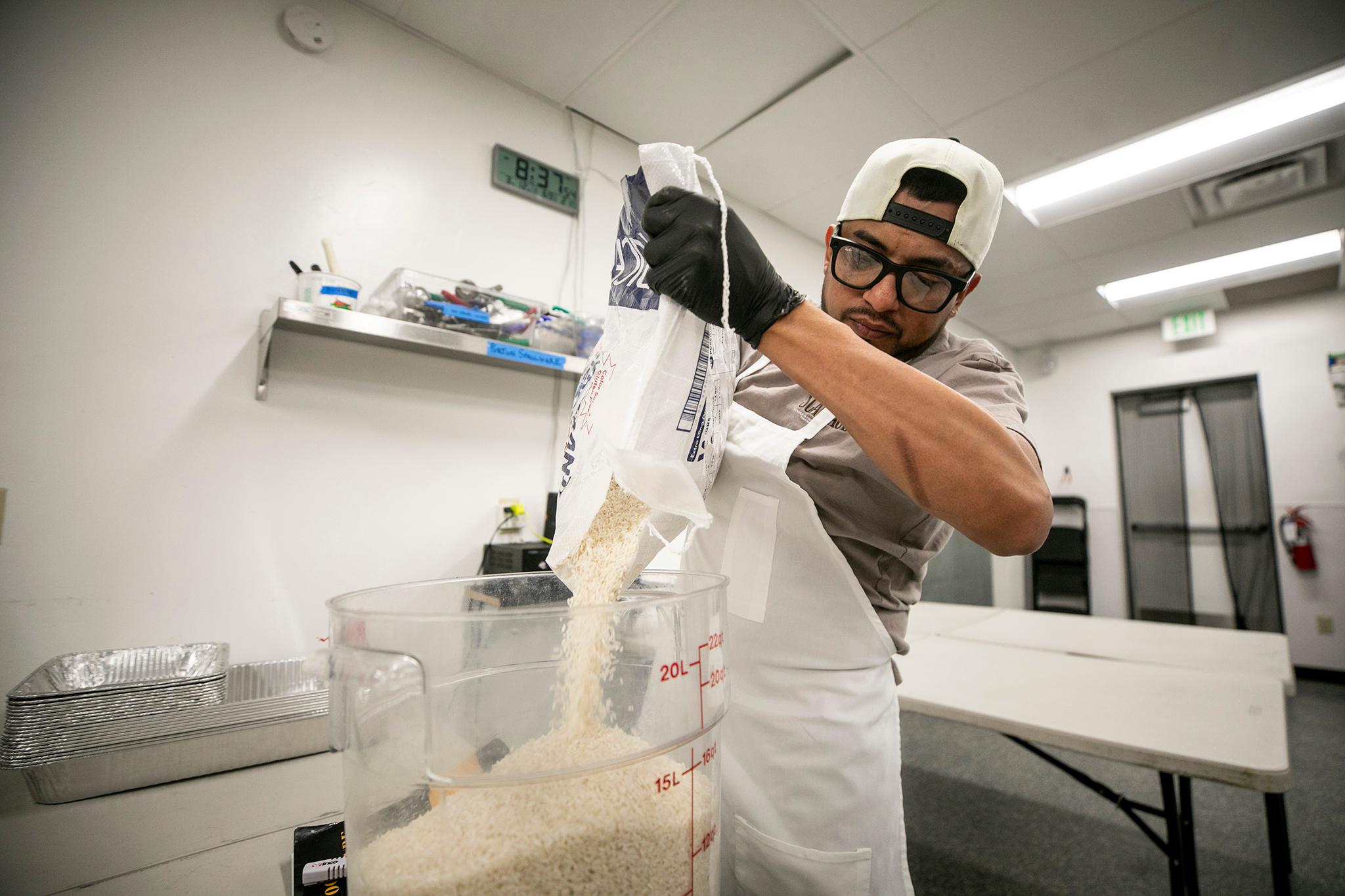It's been a busy year for Alejandro Flores-Muñoz.
As Denver sought to shelter immigrants arriving from the nation's southern border, the city hired the chef and entrepreneur to cook meals for some of the thousands of people filtering through their shelters and hotels.
"We have been slowing down, but at one point we were making about 750 meals a day," he told us. "We've done about 56,000 meals."
This is important work for Flores-Muñoz. Not only has his deal with the city been a boon for business, Flores-Muñoz can relate directly to the people he's fed. He was brought to the U.S. as a 6-year-old by his parents, and he's faced his own obstacles finding his place in this country.
"Everything that's happening with the border and with new immigrant arrivals really hits home me," he said. "Being an undocumented immigrant in this country, having [Deferred Action for Childhood Arrivals protection], having work authorization, living in a mixed-status family. Being an activist for immigration, being part of the solution of how we treat newcomers into this city has been rewarding, absolutely."
As border crossings reached new highs in 2023, residents of Denver and beyond have renewed discussions about America's immigration policies: Can people seek safety here? Who can work here? Who will be allowed to stay?
While these are new conversations for many, there are at least 150,000 people across Colorado who've had to think deeply about these issues for a long time: residents like Flores-Muñoz, who face major legal barriers to obtaining permanent legal residency. For decades, some have had to learn how to make a life in society's margins by skirting or breaking employment law, and have faced the wrenching instability that comes with existing in an ever-changing landscape of rules and rule-makers.
Though the newcomers and their established predecessors are different in a lot of ways, their futures both depend on the networks they can leverage in the present and the priorities of whoever holds power in Washington, D.C. And as immigration continues to headline election speeches and political rhetoric, some in their position are hoping this moment of so many arrivals may help push that discourse towards empathy.
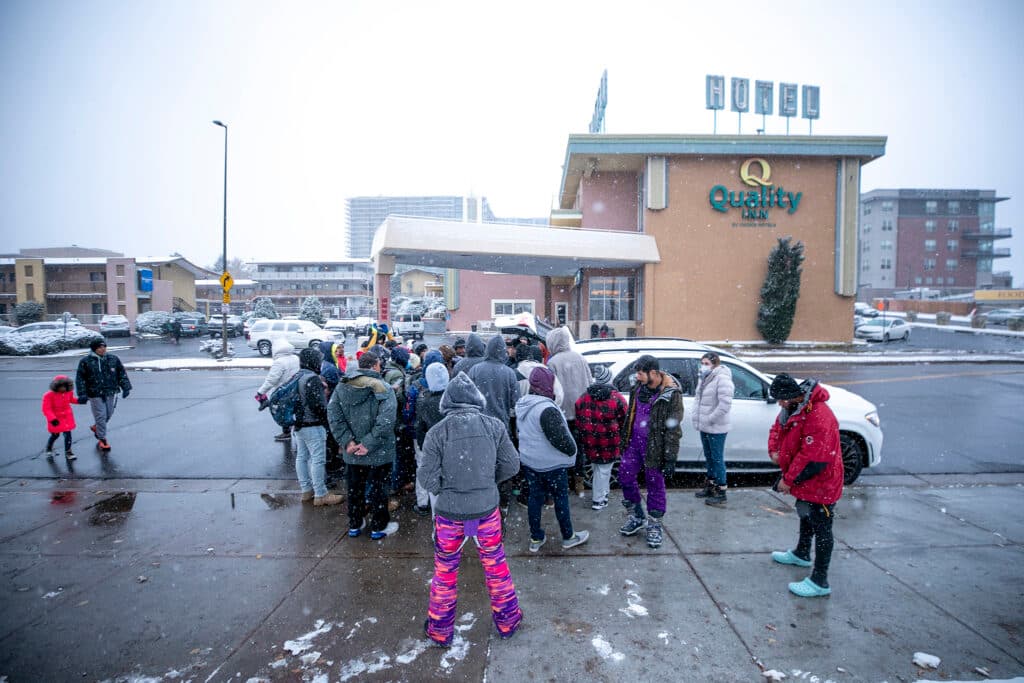
Longtime undocumented immigrants know what new arrivals will have to learn: Survival comes down to grit and who you know.
Flores-Muñoz's mother brought him and his brother to the U.S. from Mexico in the late '90s. The family crossed into the country undetected, like so many others during that era, meaning they'd have to be careful to avoid any entanglements with immigration authorities once they settled in.
Working a job the usual way, with a valid Social Security number and work authorization, wasn't an option.
"It was always under the table, from day one, when we arrived in 1998," he told us. "Since then, there hasn't really been any type of law or any type of federal program that would allow us to seek that path [to legal work]. And that's the case for many, many folks."
Like newcomers in Denver today, who've resorted to washing windows and selling crafts to make ends meet, Flores-Muñoz's family used what they knew to get by.
"My mom sold goods at the local downtown, and made baked goods or sold tacos or food," he remembered. "That's often the only option folks have when first arriving to this country, is doing some sort of side hustle to try to make some income."
Before DACA, Flores-Muñoz worked gigs but never had an official business to operate under. The rest of his family would remain in that limbo, working in the shadows, even until today. But a new path opened for him in 2012, when then-President Barack Obama announced the creation of DACA, a program that's shielded over 800,000 people like Flores-Muñoz, who were brought to the U.S. as kids, from deportation and grants them work authorization.
"When I first got DACA, it opened up a lot of doors for me. Not only physical doors," he said. "Having a nine-digit number, a Social Security Number, also opened my mind. Like, what could I do now?"
He turned the side hustle into a small business. Building his career took work and assistance from people who knew the ropes, he said, especially since the business world can be extra tricky for someone in his position. But facing those challenges was worthwhile. He bought a food truck in 2018, then graduated to a commercial kitchen, where he now preps meals for the city.
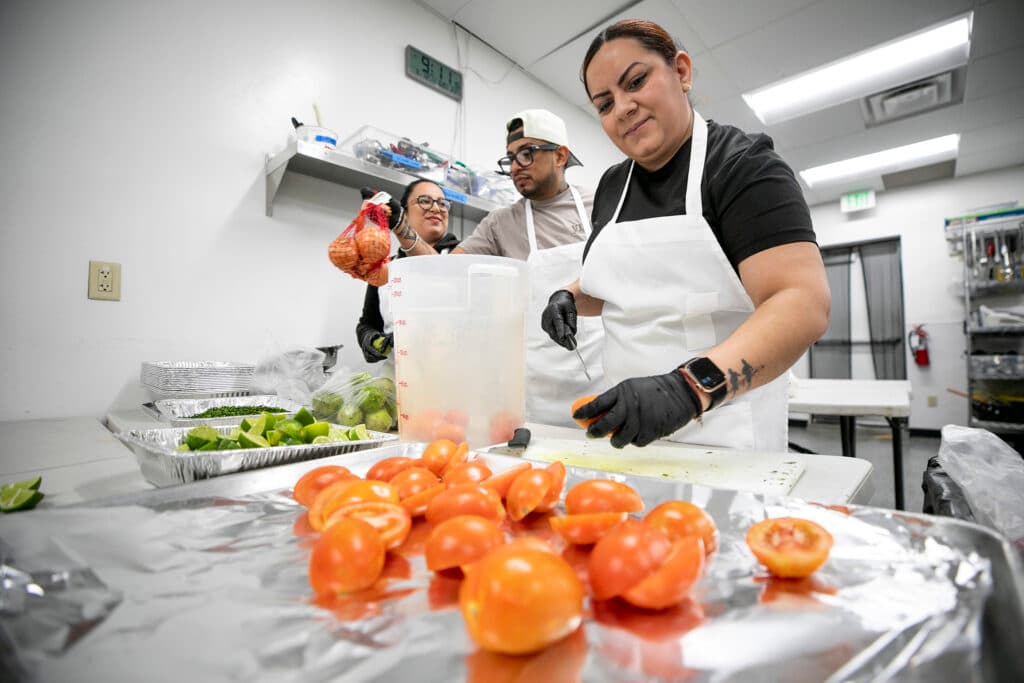
Undocumented members of Flores-Muñoz's generation sometimes had to just hope employers wouldn't ask for a Social Security number when they were starting a new job. Others bought fake or stolen numbers to make ends meet, meaning the federal government still took taxes from their paychecks to fund programs they'd likely never be able to access.
And as Flores-Muñoz began to research how to "legitimize" his hustle, he learned that he could have gotten an Employer Identification Number from the Internal Revenue Service and used it to start an LLC before he obtained DACA. That realization came too late, but it spurred him to spread the word.
He's now an evangelist for entrepreneurship within immigrant communities, guiding people in the same way others helped him. He even wrote a book on the topic, "No Papers No Fear, You Can Do Business Here."
"There are ways that folks can start making a living here right away," he said. "So for me, it's just trying to showcase that it can be done, and that there are legal paths to do that."
It's still unclear how many new arrivals will end up living as undocumented immigrants in Denver and the US
Besides different home countries and cultures, the biggest thing separating new arrivals and people like Flores-Muñoz is how they came to the U.S.
Many Mexican families who came here in the 1990s crossed the border in secret and stayed out of sight. But many people arriving today have had contact with border officials, including most of the 39,000 people who've stayed in city-run shelters.
Some, who arrived before August of last year, qualified for Temporary Protected Status (TPS), which President Biden's administration opened to Venezuelan nationals last year.
Others, who scheduled a border crossing with a U.S. Customs and Border Protection app, were granted humanitarian parole.
Anybody seeking asylum in the United States is in a precarious situation.Laura LunnDirector of advocacy and litigation for the Rocky Mountain Immigrant Advocacy Network
People can get work authorization in both cases, but these allowances aren't permanent. People will likely need to renew their statuses here regularly until those programs are canceled, or they're granted some other type of relief.
Others simply crossed the border, encountered border patrol and asked for asylum, relief from a credible fear of returning to their home countries that, historically, is usually declared after someone crosses into the country.
Unless people with TPS or parole marry a U.S. citizen or legal permanent resident, asylum is likely their best option to live here legally in the long term.
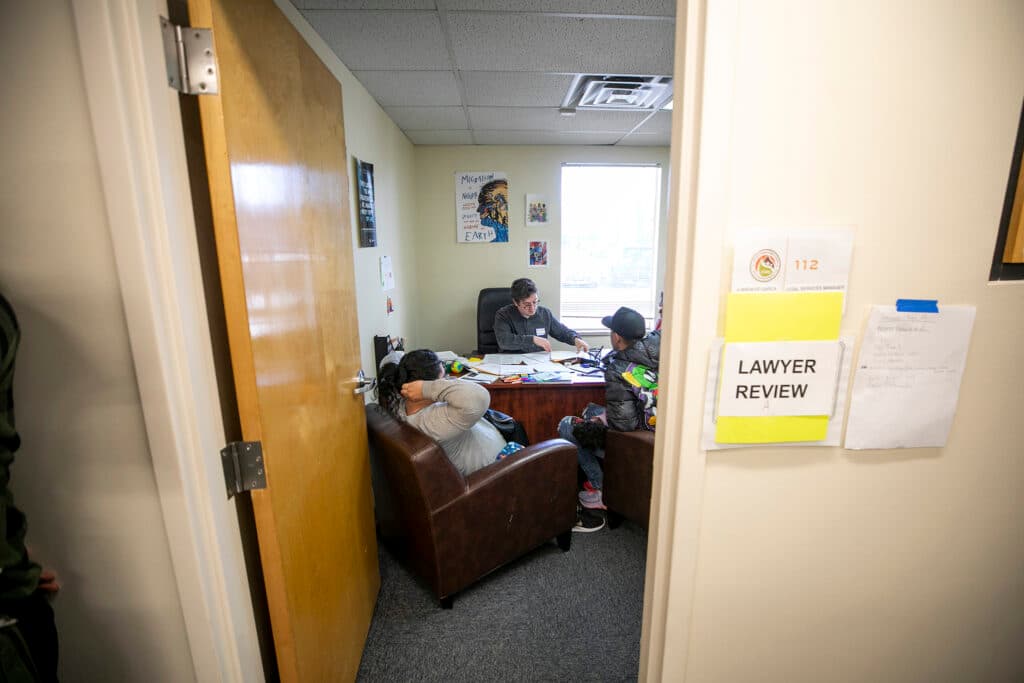
Attorney Laura Lunn, director of advocacy and litigation for the Rocky Mountain Immigrant Advocacy Network said many people who lose their asylum cases will likely not end up undocumented in the U.S. The government knows who they are, and in some cases is tracking people with ankle monitors.
"Unfortunately, if someone's case is denied, then they're likely going to be deported," she told us. "It's not that they would then just live here without status. They would just not live here anymore."
Though President Donald Trump sought to restrict asylum, and President Biden is reportedly considering the same, Lunn said most people she's encountered do have claims that could secure their futures here – that they would be in danger if they returned home. The issue, as usual in her field, is a lack of resources, compounded by the fact that many new arrivals' cases have been fast-tracked.
"At this point, I think Colorado and New Mexico are tied for the lowest rates of representation in immigration court of any states in the country, at 14%. And that is because we have seen the docket here grow – almost quadruple – in such a short period of time. So anyone seeking asylum is going to have a very, very hard time finding access to council and asylum is incredibly complicated," she said. "Anybody seeking asylum in the United States is in a precarious situation."
DACA's underlying risks demonstrate the challenges new arrivals face as they reach for their own temporary statuses.
While Flores-Muñoz did not need DACA to start his own business, the program provided a crucial chance at a regular life for people like Fryda Faugier Ferreira, who worried that being barred from legal work would dash her dreams of going to college and moving on with her life.
"I finally felt a sense of normalcy," she remembered. "Did I still struggle a ton? Yes."
To start, she and her family worried that the program could be a trap. She'd have to hand the government all kinds of information to apply, and they could imagine how that could be turned against them.
But once she applied, maintaining that status became her true struggle. DACA is temporary, and re-applying every two years costs people hundreds of dollars. Each time that renewal came up, Faugier Ferreira said she worried that the rug might be pulled out from under her.
"It's made me live in increments of two years," she said. "It's given me a lot of anxiety."
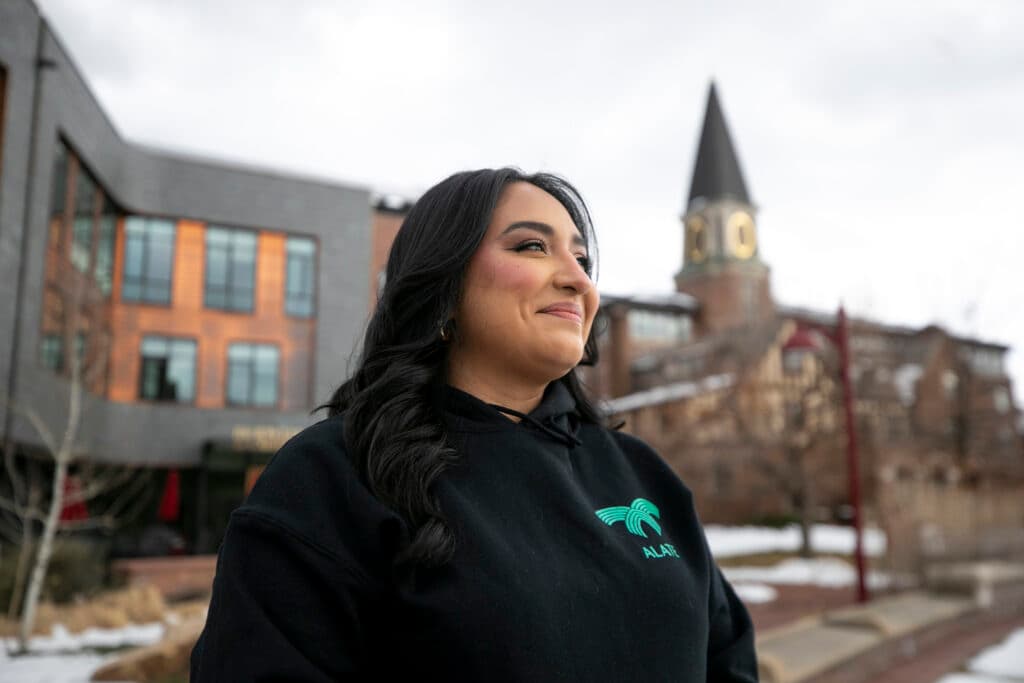
Her fears weren't misplaced. Because DACA is a form of prosecutorial discretion created by a presidential order, the program isn't permanent and can be rolled back at the discretion of a new chief executive.
President Trump's administration attempted to end the program in 2017. Though the Supreme Court rejected his efforts, subsequent cases filed in lower courts blocked new applications for the program and continued to chip away at its allowances.
Lunn said these latest attempts to end the program will likely "strip" the policy of any usefulness. If Trump wins the 2024 election, he's said he'll try again to shutter the program entirely and could pursue mass deportations.
New immigrants arriving today cannot apply for DACA, but their ability to stay here under Temporary Protected Status and humanitarian parole could likewise be upended under new federal priorities.
It's one reason why immigration advocates have relentlessly pushed the message that Congress must pass some kind of immigration reform, which might create a permanent and orderly pathway for people to come to the U.S. – and consolidate the patchwork of temporary programs into something more cohesive. It's been decades since laws underpinning U.S. immigration policy have been meaningfully updated.
Growing beneath this moment is a feeling of hope, that new alliances could push immigration policy towards something different.
On a recent Saturday, about 60 people from Venezuela filed into an office building in Valverde to get help filing for TPS. Most, if not all, qualified for work authorization. They just needed a hand filling out the paperwork.
Jennifer Piper, an advocate with the American Friends Service Committee who helped organize this event with the Colorado Immigrant Rights Coalition (CIRC), said TPS was absolutely worth pursuing, regardless of its temporary nature.
But there was something deeper happening in that room. For years, CIRC was an organization built by and meant to serve Mexican-Americans, like Flores-Muñoz and Faugier Ferreira. The fact that Venezuelans are now connected to them meant that their coalition was growing in a new way.
"They're part now of a larger community of people who need to watch out for one another, and fight for dignity for the whole immigrant community," Piper told us. "If we do that together, if we're unified amongst the newly arrived communities and the communities who've been here longer, that equals dignity for more folks."
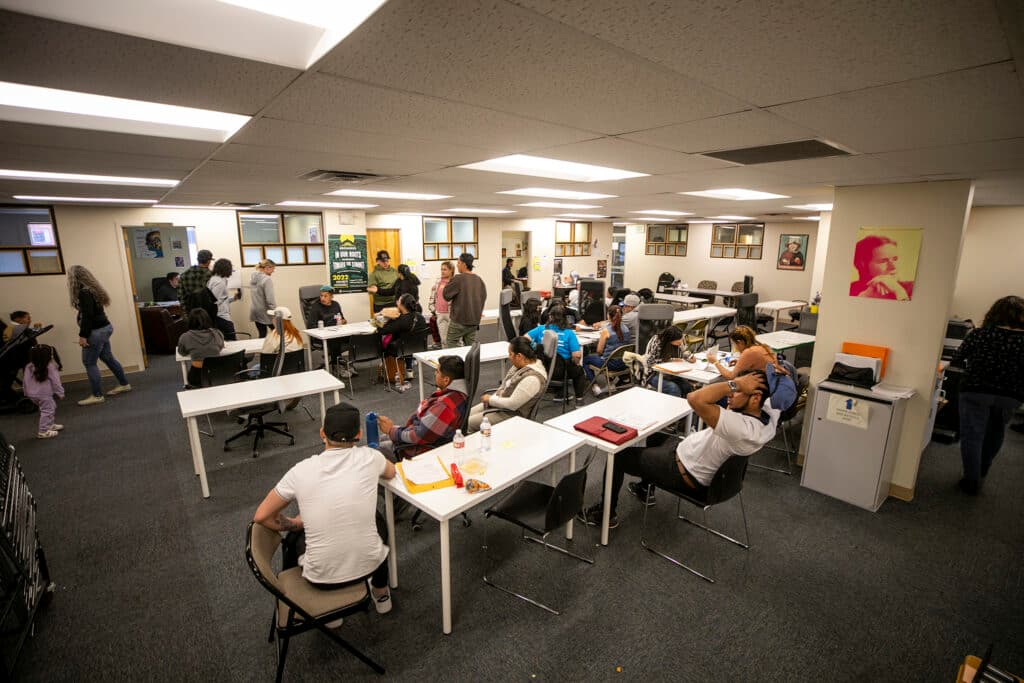
Still, Flores-Muñoz said some from his generation have thumbed their noses at newcomers, rolling their eyes at Denver's aid efforts.
"They're like, 'Well, when I came to this country, I didn't get this red carpet treatment.' And I have to remind them that this is not a red-carpet treatment. These folks had to travel three months and they have to come to this country with nothing," he said. "If anything, this is enhancing us as an overall immigrant community, because their perspectives are similar to ours. Their struggles are similar to ours."
Flores-Muñoz once relied on a network to make a life in the U.S. Now that he's found stability, he's been feeding back into those networks.
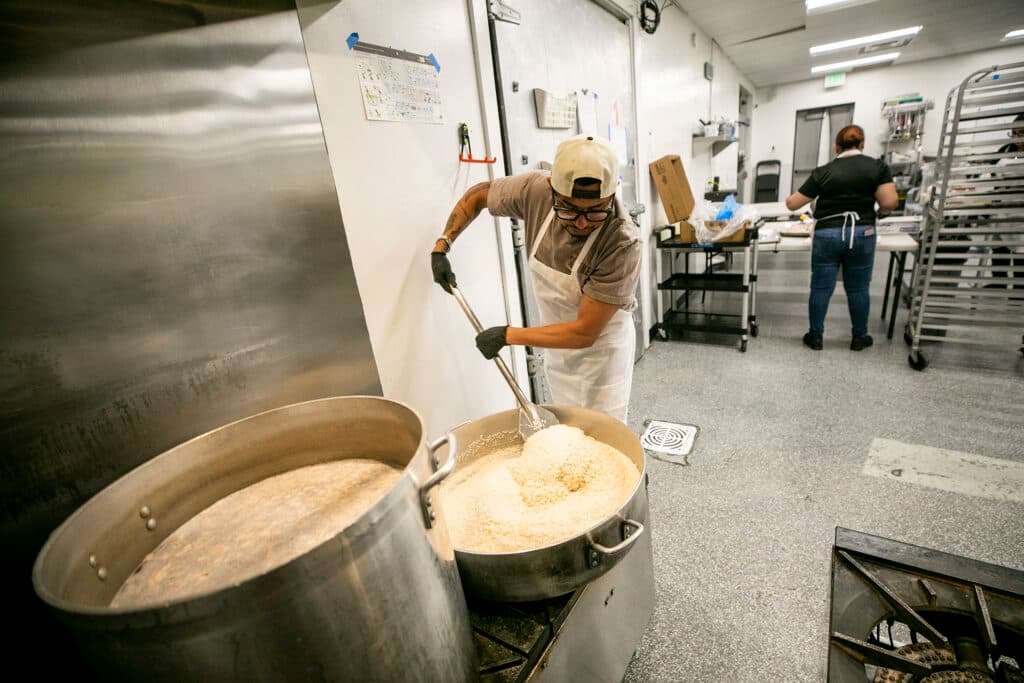
He's not alone in that work. Faugier Ferreira now works with undocumented students, coaching kids who no longer can access DACA through college. She's been hearing from newly arrived families more and more, as they begin to understand what it will take to send their kids to school and beyond.
Newcomers may not become perpetually undocumented like many who came before them, but they'll need the same tools their predecessors relied on as they figure out how, and whether, they'll find the safety and prosperity they hoped for when they left home.
"Those connections and that network is still crucial, regardless," Faugier Ferreira said. "It's going to determine how successful they are here, and what they may be able to accomplish here."

